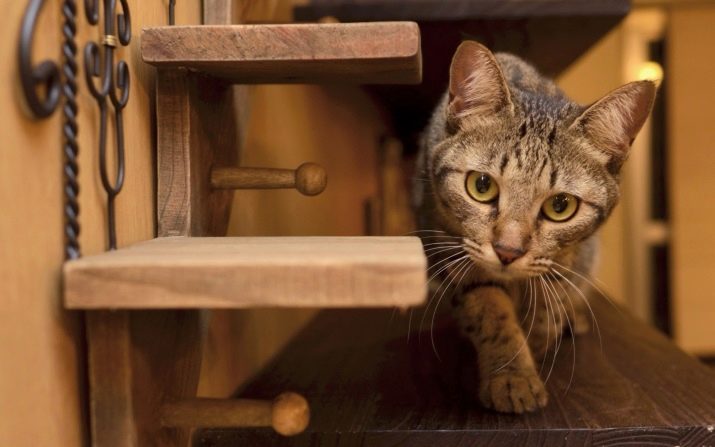How to train a cat to a new home?

Moving to a new apartment or house is always stressful for all its participants. But if people perfectly understand for what purpose it is being done, then our younger brothers sometimes get lost and cannot adapt to new conditions in any way. How can you help your cat to feel "at home" in a new place?

Adaptation of an adult pet
Preparing to move to a new place is necessary not only for future owners, but also for pets. It’s no less stressful for them. To quickly adapt the animal to new conditions, the owners will need to take the following simple steps.
- Get a special cat sedative at the pharmacy a couple of weeks before you move. It should be given even before the move, so that at a crucial moment the cat's psyche is stable, and she can more easily survive the move. Preparation for such an event begins in advance: you fold all your things, remove carpets, curtains and other furniture. For a pet, this is also incomprehensible and exciting. This is the second reason why you should start giving your pet a sedative in advance.
- To quickly accustom an adult cat to a new home, try to complete all repairs before moving. She will be scared anyway, and if there is still noise and dust all the time, she will not be able to feel safe at all.
- Try to be with your pet when you move.... He sincerely doesn't understand what's going on. He needs your help and support. Entering the new apartment, walk with him through all the rooms. In this case, it is advisable to stroke and talk to him affectionately.
- Often, in a new environment, cats find a secluded corner and hide there. Don't worry about this.This is natural behavior. Do not try to pull the animal out by force. Give him time to calm down and understand that it is safe here.
- Do not forget to bring your pet's belongings to your new apartment. An old house or lounger, bowls and tray will help you quickly get used to the new environment. Even if these items are already worn out and you would like to replace them, do not rush. This can be done a little later, when the pet is fully adapted.

The appearance of a kitten
How long the kitten will get used to the new place depends largely on the new owners. Another important factor is the age of the pet. If you take an animal still very tiny (up to 1-1.5 months), then it will be difficult for him without a mother. At this time, the kittens are completely defenseless. Most likely, the kitten will constantly call mom and look for breasts.
Therefore, experts do not advise taking kittens from the mother at such an early age. An exception will be made only for those unfortunate abandoned pussies that you found on the street and decided to take to your place.
When the kitten has grown up and has become a little independent, you can transport it to new owners. But this must be done wisely.
Taking a kitten, you must understand that he needs care and attention. Indeed, in the former family, he played all day with his mother-cat and his brothers and sisters. Here he is all alone. It will be great if you can take a vacation or arrange your work schedule so that someone is always at home.

When you pick up your pet, Ask the former owner for a small piece of the bedding he slept on. Familiar and familiar smells will remain on it for a long time, and the kitten, smelling them, will know that he is safe.
Another trick is to put a watch in a basket or box where the baby will sleep. Their ticking is similar to the heartbeat of a baby's mother. It will have a calming effect on the kitten.
After the baby gets used to and adapts, the watch can be removed.

Not all owners like the animal to sleep with them. It is necessary to accustom a kitten to a certain place to sleep from the first days. This should be the rule for him. If you decide to take pity on him and let him sleep at your feet for the first week, then in the future it will be difficult to rid him of this habit.
In order for the pet to go to its basket more willingly, put catnip there.
It can be easily found in specialized stores. This smell will attract the animal, and the kitten will more willingly agree to sleep in its new nest.

Street cat in the house
Sometimes people did not intend and did not plan to have a pet at all, but when they saw a homeless unfortunate cat on the street, they decided to take it to them. But in this case, one must be prepared for the fact that it will take some time for adaptation. Despite the fact that your living conditions are definitely better than on the street, the baby also needs to get used to them.
The first trouble new owners face is litter training. On the street, she went to the toilet anywhere, and no one ever scolded her. You have completely different rules. Most likely, it will take several days, or maybe longer, for the pet to understand where he needs to go to the toilet.
The goodwill of the new owners will most quickly help you get used to the apartment. Don't be too hard on your pet. He just doesn't know many of the rules for living with you yet.
Over time, he will understand that sharpening his claws on the sofa, walking on the table or playing with your things is unacceptable.
In the meantime, it is better to give your pet more attention and make it clear that you are happy with him.

Interaction with other animals
Another problem in adapting an animal to a new place can be the presence of other pets. If they had previously lived together, then no special problems should arise on this basis. But if cats see each other for the first time, then conflicts cannot be avoided.
Quite often there is a situation when a young couple decides to live together, but each of the young people already has a cat or cat. It is unacceptable to abandon your pet due to new circumstances, therefore, it is necessary to take into account the psychology of cats' behavior and try to establish contact between them. It is not an easy task to adapt a middle-aged cat to life in another apartment, and even in the neighborhood with another feline.
A pet that has already lived in this room will feel like a master, which means it will guard and defend its territory. This is normal and natural.

The important thing here is how the new owners will behave. It is unacceptable to endlessly scold a cat who protects its borders so zealously. This will not lead to an improvement in the situation. The best way is to demarcate the territory.
Let each pet have their own space. This also applies to a place for rest (baskets, a house), bowls, and a toilet. While the old owner gets used to the new neighbor, you can even feed them one at a time to avoid unnecessary hassles. If possible, make sure that their paths do not intersect. Place the bowls in different corners of the kitchen, move the trays as far as possible from each other.
Resting places should be comfortable and cozy, but located in different parts of a room or even an apartment.

Not all animals hold the defense for a long time. There are often cases when, after a couple of days, new neighbors begin to behave like bosom friends.... They play together, have fun and eat from the same bowl. This is the ideal situation.
Much depends on the age and temperament of both pets. In any case, if it did not even work out to quickly reconcile two cats or cats, do not give up your attempts.
Try to find a compromise. For example, provide two different approaches to the tray and bowls. To do this, you can even build a kind of path from the shelves on the wall.

Frequent mistakes
Adaptation of a kitten to a new place of residence is easier and faster than in adults. At the same time, the owners themselves can make mistakes that only exacerbate the current situation and prevent the pet from quickly getting used to the apartment.
- Do not throw away your pet's old belongings and objects. If he had a favorite toy, bedding, and litter box, have them move with you. Familiar smells and objects will instill confidence and calmness in your pet.
- Lack of attention. When moving, the owners have a lot of trouble. It is necessary to arrange the furniture, put things in order, put all the items in their places. It can take one day or a whole week. But do not ignore your pet at this time.
She needs affection and support. Take a couple of minutes to pick her up, stroke her and play with her. In a new place, the cat may not eat, drink or even go to the toilet for several days. Moreover, all this time she will be in some secluded corner. Don't try to get her out of there.
Better come up, put a bowl of water next to it, a tray, talk affectionately and pet the cat. So she will understand much faster that there is no danger.
- Punishment. If the cat does not go to the litter box, but relieves itself in the wrong place, then this is not a reason to scold her. You should lightly grease the litter box with cat urine so that the smell remains, sit the cat on it and pet it. So you explain to her that this is exactly the place where you can relieve yourself and not be punished for it.
Do not scold your pet for other pranks and offenses. As we already wrote, the cat just doesn't know the rules of living in a new house yet. Help her, don't punish her. This will help you achieve results faster with minimal effort.
- Provide a relaxed atmosphere in your home. Everyone adapts differently. If you see that your darling is not easy, then save her from unnecessary worries. Do not gather noisy companies and at least temporarily stop the repair. Many people will think that these are big sacrifices, but just think about the consequences.
An anxious cat can cause much more trouble to its owners. For example, she may outright refuse to go to the litter box. The risk of a nervous disorder is not excluded, the consequence of which can be an unbalanced psyche and aggressiveness of the animal.


Cats are very smart pets. They are able to quickly adapt to both a new home and a new owner. It takes a little effort and this process will be easy and fast for both the owner and the pet.
The main factors for quick adaptation are your love and affection.
Feeling your concern, your darling will quickly understand that nothing threatens her here.


See below for instructions on how to accustom your cat to a new home.
































